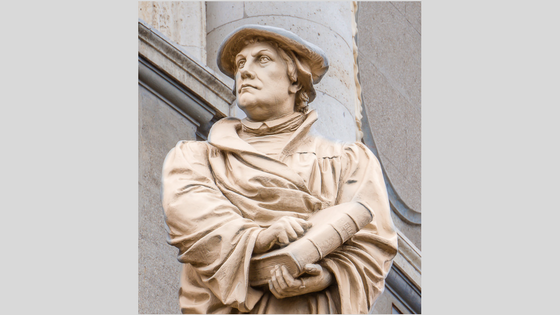Martin Luther: Greatness in the Face of Depression
Plateaus, Setbacks, and Martin Luther
I’ve chatted with a few people new to their diagnosis lately, and I’ve noticed a common theme: Initially, there is relief. There’s finally a name for the pain they’re feeling and hope reenters the equation. A bit into the journey, however, there’s a plateau or a setback. Despite all the work that’s been done, despite all the efforts they are continuing to make, it feels like progress has stalled. It becomes a crisis point.
Hope disappears, and a new possibility emerges: I’m never going to get better. For many, their diagnosis begins to feel more like a death sentence than a beacon of hope that a better life is possible.
Here’s the reality: When we push on, plateaus pass. The struggle makes us stronger and grows our resilience. Hope remains, even when we don’t see it. And, even in the pain, greatness is possible.
Our diagnosis doesn’t keep us from doing amazing things. In fact, my husband said to me the other day that it seems to him that people with mental illnesses head in one of two directions: Either they don’t learn to manage their symptoms and therefore lead terrible and frustrating lives (including becoming addicts and ending up homeless), or their disorder drives them to accomplish amazing acts. In fact, he’s started re-examining his heroes and realizing that many (maybe even most!) live (or lived) with a disorder in some form.
Don’t believe me? Let me point you in the direction of Martin Luther, a man who changed the shape of Christianity, public education, and politics in deep, profound, and lasting ways. Even now, more than 500 years after his death, the impact of his life is still felt.
Yet, he lived with depressive episodes through most of his adult life and some even argue that he likely had bipolar disorder.
The Story of Martin Luther
While we don’t know the first time that Luther was marked by depression, we do know that he lived with it during his time as a monk. In fact, Luther was well-known and at times even mocked for his diligence in confession. As soon as he left the confessional, he was searching his soul for new sins he’d committed and forgotten or neglected to confess. It became a trial on his fellow priests, who were trapped in the confessional with Luther during these long sessions.
Between sessions, and also in the custom of the times, Luther repeatedly flogged himself in an effort to demonstrate his repentance and grow closer to God. These self-inflicted beatings were sometimes so extreme that he drew blood.
Also a scholar, Luther bucked conventional wisdom at the time and started studying the Bible directly. (At that point in time, the theology was developed through abstractions from other texts and through personal revelation alone. Often, this allowed personal biases and politics to inform the theology as much as spiritual insight did.) He searched the Bible diligently, looking for an answer to his persistent brokenness. Finally, he found it in Romans 1:16-17:
The power of God for salvation to everyone who believes, to the Jew first and also to the Greek. For in it the righteousness of God is revealed from faith for faith, as it is written, ‘The righteous shall live by faith.’”
Out of this revelation, Luther realized that God grants salvation to all who believe in him. No works, no acts that Luther did could possibly lead him to salvation; salvation was already his through the sacrifice of Jesus. This revelation worked a tremendous change on Luther’s spirit and propelled him into what many with bipolar disorder might recognize as a manic phase: He hyper-focused on the Bible, looking for other evidence that his new understanding was accurate. As this new philosophy took shape, Luther was known to write for days with incredible productivity, developing what would be known as the 95 Theses.
One of my best resources for this post was this book by Eric Metaxas. He humanizes Luther and explains the nuances of the times with great clarity. It’s a great read and one I recommend.
Still a scholar, however, Luther posted his Theses on the church doors (which functioned as a bulletin board in those days) and invited debate. While he never got the debate he earnestly desired, events quickly moved beyond his control as print publishers copied and distributed them to a larger populace.
While there’s a lot more to the story, including how larger events within the Roman Empire and the Catholic Church of the time influenced their responses to Luther, his impact grew beyond his local community and into what is now recognized as Germany.
Further, Luther preached many sermons on based on this new theology (now called “Protestantism”). One key area he argued was that the Church must remain separate from the State, that the local nobility were answerable to God and God alone.
This was a profound change in the political arena. With the nobility answerable only to God, it meant that they had an obligation to care for those in their respective territories, ensuring that the populace was well-cared for and not taken advantage of. In particular, this meant running off the priests who peddled indulgences, which were sold as helping people (and their dead relatives) make their way through Purgatory and into Heaven significantly faster. A key revenue stream for the Catholic Church (and a primary means for funding the construction of St Peter’s Cathedral in Rome), this new idea threatened the underpinnings of the Catholic Church and specifically, the power and influence of the Pope.
Beyond this, Luther also argued that the common folk have equal access to God. No longer should they be denied Communion, or denied the right to read the Bible. They were on a par with priests and the nobility in the eyes of God, and deserved to be treated as such. Naturally, such a populist view during that time grabbed a lot of interest.
Luther’s Influence Grows
Many of Luther’s sermons were printed and distributed widely, and his writings continued to permeate an ever-growing area. The ideas contained within – that salvation and grace are gifts and not to be earned, and that the common people have as much right and access to God as priests and nobility – reached beyond the government. For the publishers, distributing anything written by Luther was essentially printing money.
Luther was condemned to death, brought into hiding, found himself in constant conflict even with friends, and kept on writing, preaching, and even translated the Bible into German (the first translation into a language approachable by the common man).
Luther’s belief in the importance of reading and studying the Bible was so strong that he pushed for local schools to teach boys to read (he also advocated for girls to be included, as well, but that was a much tougher battle). His push was successful, as local public schools began to form and people learned to read.
Through it all, he had bouts of deep depression. He complained about them in his letters to his friends. He had days where he couldn’t get out of bed at all. He also had difficulty managing his money (that responsibility fell to his wife (a former nun); their marriage was another break with religious tradition), and had other times when he compulsively wrote. In fact, he wrote the hymn “A Mighty Fortress Is Our God” while in a depression; another influence he had on church services, which previously didn’t include music!
Yet, his message continued to spread, often beyond his control and sometimes beyond his preference.
Ultimately, Luther died of natural causes in 1546. Even so, his message continued to spread, with the banner taken up by his followers. Today, we take for granted the many changes brought about by his life and often don’t even attribute them to Luther.
While our understanding of mental health at the time didn’t allow for a professional psychiatrist or psychologist to diagnose Luther with depression or any other disorder, the signals are all there. It is incredible what he accomplished even in the face his many “long, dark nights.” His story encourages everyone with a mental illness or mood disorder.
Our disorders are not death sentences. They don’t have to hold us back. Our plateaus and setbacks are temporary and do not erase the progress we’ve already made. Luther’s is only story of many people with incredible accomplishments in the face of mental illness.
Maybe you aren’t looking for greatness. Maybe you aren’t looking to leave an impact like Martin Luther. That’s OK; we’re not all destined for that kind of fame. Even so, his story demonstrates that a disorder isn’t the end of our lives. We can continue on, and achieve that which is most important in our lives.
Have you hit a plateau or a setback? How did you respond to it?
Looking for daily inspiration and community? Join our warm and supportive Facebook group!










I discovered then that religion had to become real to me and I had to know God for myself. And I bowed down over that cup of coffee — I never will forget it. And oh yes, I prayed a prayer and I prayed out loud that night. I said, “Lord, I’m down here trying to do what’s right. I think I’m right; I think the cause that we represent is right. But Lord, I must confess that I’m weak now; I’m faltering; I’m losing my courage. And I can’t let the people see me like this because if they see me weak and losing my courage, they will begin to get weak.” I wanted tomorrow morning to be able to go before the executive board with a smile on my face. And it seemed at that moment that I could hear an inner voice saying to me, “Martin Luther, stand up for righteousness, stand up for justice, stand up for truth. And lo I will be with you, even until the end of the world.” And I’ll tell you, I’ve seen the lightning flash. I’ve heard the thunder roll. I felt sin-breakers dashing, trying to conquer my soul. But I heard the voice of Jesus saying still to fight on. He promised never to leave me, never to leave me alone. No, never alone. No, never alone. He promised never to leave me, never to leave me alone.
Amen! He is faithful!